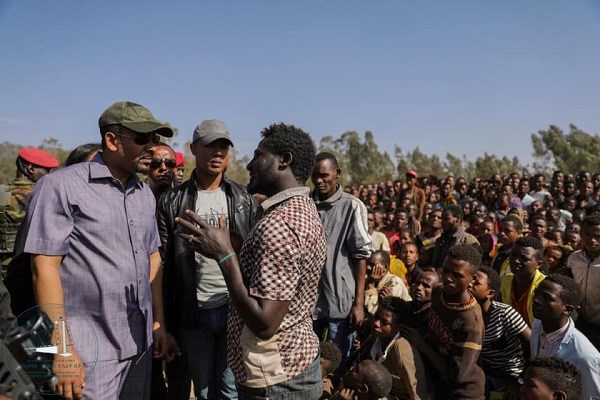
Monday March 18, 2019
credit : OPM
Unlike the first few months of his administration, a considerable number of Ethiopians now seem to be increasingly wary of Prime Minister Abiy Ahmed’s government.
Recent displacement of people, security crisis and rule of law issues in many areas across the country and demolition of residents’ houses in Legetafo with the pretext of “enforcing rule of law,” are some of the matters that trigger skepticism if Abiy’s government is capable of and/or willing to protect human rights and right to live of Ethiopians. Yet, he has still got a considerable number of supporters who seem to think that he is in a difficult position in relation to radical Oromo ethno-nationalists, apparently commanding great influence over governance structures mainly in Oromo region and to some extent in the Federal government.
Humanitarian crisis that afflicted ethnic Gedeos, who were left with no choice but to leave behind their place to become internally displaced groups after ethnic-based violence in Guji area as organized militant Oromo ethno-nationalists launch attack against them, has become the latest test case for Abiy Ahmed’s administration.
Of the currently 4 million internally displaced people, about 25 percent constitute ethnic Gedeo – that is about 1 million people.
Just like his minister for peace, Mufariat Kamil, Prime Minister Abiy told displaced ethnic Gedeo, when he paid to a visit to their temporary shelter on Sunday March 17, 2019, that his government sent emergency aid but distribution did not go well due to the security situation in the region. Apparently, the same organized groups who caused the displacement intercepted the humanitarian aid and seized it for their own use, based on Muferiat’s remark on Saturday.
“Because of the problem few individuals created, the current condition of displaced people is of a great concern. We will do everything we can to change the situation,” said Abiy, as reported by Ethiopian News Agency, state media.
Food distribution is commenced, he told Gedeos with whom he had a meeting during his visit, as of Sunday after screening to identify those who need emergency food aid.
Had it not been for Ethiopian activists’ online campaign on behalf of ethnic Gedeo, it is unclear if the issue of ethnic Gedeo could be in the limelight today.
But now Ethiopians need Abiy’s government not just to cater for emergency food aid but also to deal with the root of the problem so as to have lasting solution. There are voices in social media who advocate that displaced ethnic Gedeo, too, should be resettled in the capital Addis Ababa just like Oromos who were displaced from Ethio-Somali region.
Acting mayor of Addis Ababa, Takele Uma, who is one of the executive committee members of Oromo Democratic Party, a party that is acting more like what TPLF minority used to act like in the past, was quick to announce on Sunday a 30 million birr in aid for displaced Gedeo.
Ethiopians outside of government structure have launched their own campaign to support displaced Gedeo. Through Global Alliance for Ethiopians, a not-for-profit US based Ethiopian organization, on the other hand raised more than $1 million dollar in just two days by launching an online fundraising campaign on GoFundMe.